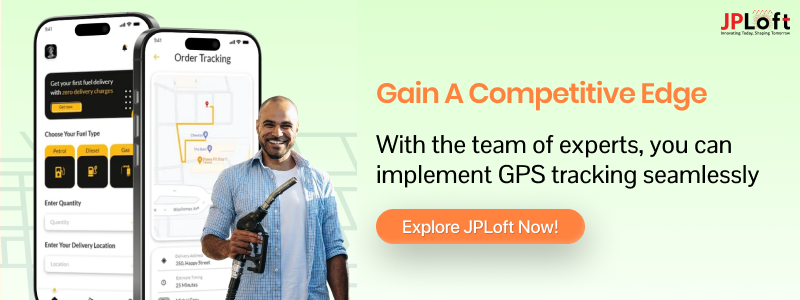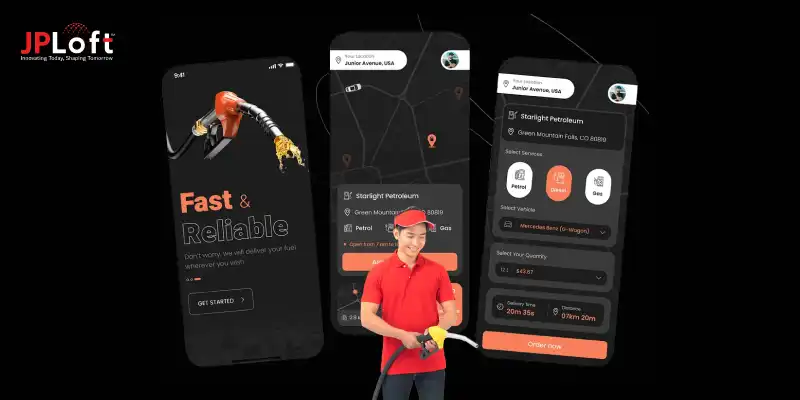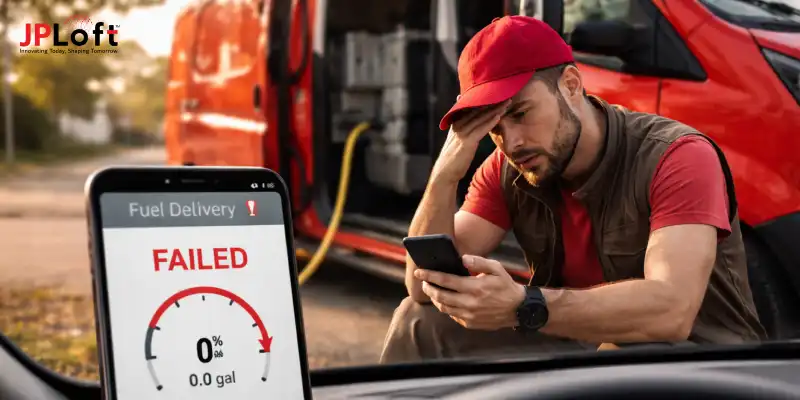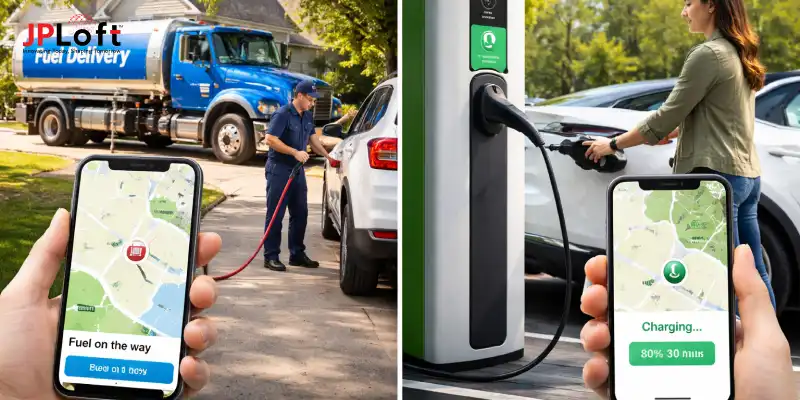GPS tracking- a feature for the fuel delivery app that you shouldn’t ignore.
This feature can help you lead the app and is a wise investment. It is an important method to track the location of your valuable assets, such as equipment or cargo.
Want to know more about the role of GPS tracking in the fuel delivery app for your project?
Well, we are here to help.
Fuel-Delivery App and Related Stats
Let’s begin with the concept of a Fuel delivery app, along with the related stats for those who are unaware of this concept.
A fuel delivery app is a mobile application that helps to deliver fuel directly to the specified location, keeping you on schedule without any kind of hassle.
It is an on-demand fuel-delivery service that allows users to order fuel directly to their specified location.
These apps generally have a user-friendly feature and interface for scheduling deliveries, tracking orders, and making crucial payments.
The fuel-delivery app and system market size is expected to reach $8.75 billion by the year 2032. Additionally, an online fuel delivery market has grown at a CAGR of 7.1%, making it a lucrative option for entrepreneurs to invest in the fuel delivery technology.
Additionally, the fuel delivery market size was USD 2.54 billion in the year 2019, and is projected to reach USD 3.94 billion by the year 2032, exhibiting a CAGR of 5.74% during the forecasted period.
Are you ready to create a Fuel-delivery app?
In this process, features play an important role, you cannot think of an app without them, right?
Well, GPS tracking is among them. Are you worried about why include this app in the list?
Let’s learn about the benefits of GPS tracking in the Fuel-delivery apps, within the section below.
Benefits of GPS Tracking in the Fuel-Delivery App
To begin an online fuel-delivery app business, it's important that you know the benefits of every feature you include within the same.
Why include a GPS tracking feature in the fuel-delivery app?
Well, all fuel-delivery app features are crucial; however, investing in GPS tracking is much more impactful.
Let’s learn the advantages of the GPS tracking feature in the fuel delivery app below.
![]()
1. Real-Time Location Tracking
The global positioning system (GPS) operates with multiple satellites in orbit to track the actual position of the fuel-delivery vehicles.
These satellites in orbit are helpful to send signals to the GPS tracker, which uses these signals to monitor the real-time tracking and to determine the exact location of the fuel-delivery vans or vehicles.
2. Optimized Delivery Routes
With the help of a GPS tracking system, the fleet managers can comprehensively view the real-time traffic conditions for the specified locations.
Through the help of this feature, the fleet managers can comprehensively view the real-time traffic conditions to deliver the fuel to the specific locations.
3. Enhanced Driver Efficiency
After connecting to the engine control module (ECM), the fleets can monitor their fleet tracking. The data is analyzed about the service requests, which allows generation to the optimization of the routes based on the type of information received from the GPS trackers.
With the driver efficiency, the approach ensures an efficient completion of service requests by avoiding any delays in finding the best routes to deliver the fuel.
4. Accurate ETAs for Customers
This is an important benefit for the customers that helps to identify the accurate ETAs for the users through providing the real-time tracking advantage in the app.
With the help of the GPS tracking feature it provides the capability to track the fuel-delivery vehicles nearby to their location.
5. Reduced Fuel Consumption
The GPS technology in the fuel delivery apps assists in reducing fuel consumption through optimizing routes, minimizing unnecessary travel, and encouraging fuel-efficient driving habits among the users.
This system is designed to track the fuel consumption in real-time, enabling the fleet managers to identify vehicles or drivers who are consuming more fuel while driving.
6. Improved Customer Satisfaction
The GPS integration in the fuel delivery apps enhances customer satisfaction by providing real-time tracking with accurate estimated arrival times (ETAs) and the ability to monitor the delivery progress.
With this transparency and reliability, the users trust these fuel-delivery apps, and that helps you to improve the overall brand image.
7. Live Monitoring of Delivery Fleet
With the help of GPS technology in the fuel delivery apps, it enables the real-time monitoring of a delivery fleet system to provide accurate location data, which assists in route optimization, traffic avoidance, as well as helps in efficient dispatching of the fuel.
The GPS tracking assists the oil and gas fleets in maximizing the workday and completing an optimal number of jobs.
8. Minimized Operational Costs
The fuel delivery apps assist in minimizing operational costs through optimizing the routes, reducing idle time, and improving driver behavior.
Adoption of fuel delivery ultimately results in less fuel consumption and then to lower maintenance expenses. Through in-depth monitoring, you can optimize the resources and save operational costs.
9. Better Fleet Coordination
Investing in the GPS integration can help enhance fleet coordination by providing real-time location tracking, route optimization, and efficient dispensing of fuel.
This allows better resource allocation, with improved customer service and reduced operational costs. GPS is a feature that will help you to optimize the overall fuel delivery app tech stack.
10. Instant Alerts for Route Deviations
The adoption of GPS technology in the fuel-delivery apps enables instant route deviation alerts by providing real-time tracking on delivery vehicles.
GPS integration in the fuel-delivery apps compares the vehicle’s actual path with the planned route via route detection algorithms.
Additionally, the feature wil help you address the challenges faced while creating a fuel-delivery app via real-time analysis element.
Considering these benefits, are you ready to integrate the GPS tracking feature in the fuel-delivery app?
Well, let’s evaluate more about GPS tracking in the fuel delivery apps through learning about its impact in the following section.
Impact of GPS Tracking in the Fuel-Delivery App
What is the role of GPS tracking in the fuel-delivery app?
GPS tracking is the technology that is used to determine the precise location of an object. When it comes to fuel delivery apps, it helps to engage the users effectively.
Let’s learn more about the impact of the GPS tracking feature on fuel delivery apps below.
![]()
1] Boosts Operational Transparency
Investing in GPS tracking allows real-time monitoring of fuel delivery trucks, providing insights into the vehicle location, route adherence, and fuel consumption.
The GPS can track fuel levels and consumption trends, which helps the fleet managers to identify the additional fuel wastage, leading to more transparent as well as cost-effective deliveries.
Additionally, tracking fuel usage and delivery progress can encourage drivers to be more efficient and responsible, which tends to reduce the misuse of fuel.
2] Improves Delivery Timeliness
The GPS tracking feature within the fuel-delivery apps is an important tool for enhancing the delivery timelines and overall efficiency within the fuel-delivery industry.
These apps help in real-time tracking and ETAs, which results in delivering fuel on time. This feature allows proactive communication regarding any potential delays.
With the assistance of GPS data, you can identify and reduce idle time, which not only saves fuel but also contributes to faster deliveries.
3] Increases Business Accountability
Through enabling real-time monitoring of vehicle location, fuel usage, and position of the vehicle. GPS tracking features enhance the transparency of the businesses, identify inefficiency, prevent fuel theft, and improve operational efficiency.
This feature can help you increase the overall efficiency of the app, help to minimize costs, enhance security features, and improve overall customer service by providing valuable data for decision-making and compliance.
Additionally, it helps businesses to track employee adherence to routes, monitor the time spent at the locations, and verify on-time arrivals, which ultimately leads to improved productivity and efficiency of the businesses.
4] Facilitates Data-Driven Decisions
The GPS tracking software system helps in better inventory management, proactive maintenance, and more efficient fuel deliveries.
This data enables the dispatchers to optimize routes, reduce travel times, and minimize fuel consumption.
An effective system of fuel delivery does assist in gathering relevant data as well as providing simplified output.
5] Reduces Risk of Fuel Theft or Misuse
The implementation of GPS tracking improves fuel-theft prevention in delivery apps by providing real-time visibility into the vehicle location and fuel consumption.
You should invest in the GPS tracking feature, as it helps in monitoring driving behavior, helps in efficient route planning, and provides insurance benefits.
Additionally, it helps in providing faster recovery of the stolen vehicles and enables swift recovery by fleet managers or law enforcement.
6] Supports Emergency Response and Rerouting
You should invest in the fuel-delivery apps, which will help you in supporting in case of emergency response as well as rerouting of vehicles.
With the help of the real-time tracking feature, GPS helps businesses to improve their risk management and emergency response systems.
This technology supports safer and more efficient delivery by allowing for dynamic rerouting in response to traffic and other unexpected incidents.
7] Strengthens Customer Trust and Loyalty
Including a GPS tracking feature in the fuel-delivery apps strengthens customer trust and loyalty by providing transparency, accountability, and reliability to the customers.
It provides a clear picture to the users and reduces uncertainty when it comes to delivering fuels.
Additionally, among the other app features, this feature provides accurate delivery estimates, and they know that their deliveries are on time and reliable.
8] Helps in Regulatory Compliance
The GPS tracking system plays an important role in regulatory compliance for the fuel delivery apps by providing real-time location data, route optimization, and fuel consumption monitoring.
This data helps ensure adherence to safety regulations, environmental standards, and other compliance requirements by minimizing the risk of fines and penalties.
It is important to comply with the regulations and standards, and the GPS tracking feature helps in this scenario.
9] Improves Performance Metrics Tracking
Implementation of GPS tracking enhances performance metrics in the fuel delivery apps by providing real-time location data, monitoring driver behavior, optimizing routes, and enhancing the overall efficiency of the app.
The GPS tracking assists in route optimization by identifying the most efficient routes, avoiding traffic delays, and successfully utilizing real-time satellite positioning, enabling businesses to design and optimize delivery routes.
With the help of fuel delivery businesses, you can improve efficiency, may reduce costs, and can enhance the customer experience.
10] Drives Competitive Advantage in the Market
When GPS tracking is integrated within fuel delivery apps, it offers a significant competitive advantage through enhancing customer experience and streamlining operations.
The GPS tracking works in assisting the companies to streamline delivery routes and to cut down on travel time and fuel consumption, which allows your businesses to stand out from the competition.
With the help of the real-time tracking feature allows you to consider better dispatching, efficient route planning, and reduces time spent on unnecessary tasks, leading to providing a competitive advantage in the market.
These were the impacts of GPS tracking in the fuel delivery apps that you can consider.
How JPLoft Can Help in Adding a GPS Tracking Feature to Your App?
Are you searching for a team of experts to implement GPS tracking as a feature in your fuel delivery app?
No need to wander anywhere.
JPLoft is a leading Fuel Delivery App Development Company focused on delivering projects with integrity and honesty.
Our team is ready to help you by enabling real-time asset tracking, improved operational efficiency, and leading to better customer service through adding a GPS tracking feature in the app.
We can enable data transmission through calculated location data when it is transmitted via cellular or satellite communication to a central server.
Conclusion
Overall, the integration of GPS tracking within fuel-delivery applications transcends mere location monitoring, emerging as a cornerstone for operational excellence and enhanced customer satisfaction.
By providing real-time visibility, optimizing delivery routes, and enabling accurate ETAs, GPS significantly boosts operational transparency and improves delivery timeliness.
Furthermore, it increases business accountability, facilitates data-driven decisions, and reduces the risk of fuel theft. Ultimately, the strategic implementation of GPS technology strengthens customer trust, aids in regulatory compliance, improves performance metrics, and drives a crucial competitive advantage in the dynamic fuel delivery market.
FAQs
GPS tracking offers numerous benefits, including real-time location monitoring, optimized delivery routes, and accurate ETAs for customers. It also enhances driver efficiency, reduces fuel consumption, improves customer satisfaction, and enables live fleet monitoring, leading to minimized operational costs and better fleet coordination.
GPS tracking significantly boosts operational transparency by allowing real-time monitoring of delivery trucks. This provides insights into vehicle location, route adherence, and fuel consumption, enabling fleet managers to identify inefficiencies and reduce fuel wastage, leading to more transparent and cost-effective deliveries.
By providing real-time tracking and accurate ETAs, GPS helps ensure timely fuel deliveries. It allows for proactive communication about potential delays and helps identify and reduce idle time, contributing to faster service and improved overall efficiency in the fuel delivery process.
GPS tracking enhances business accountability by enabling real-time monitoring of vehicle location and fuel usage. This increased transparency helps identify inefficiencies, prevent fuel theft, and improve operational efficiency. It also allows businesses to track route adherence and verify on-time arrivals, boosting productivity.
Integrating GPS tracking strengthens customer trust and loyalty by providing transparency and reliability. Customers gain a clear picture of their delivery status with accurate ETAs and real-time tracking, reducing uncertainty. This reliability enhances their confidence in the fuel delivery service and improves the overall brand image.
Yes, GPS tracking plays a crucial role in regulatory compliance by providing real-time location data, route optimization details, and fuel consumption monitoring. This data helps ensure adherence to safety regulations, environmental standards, and other compliance requirements, minimizing the risk of potential fines and penalties.












Share this blog